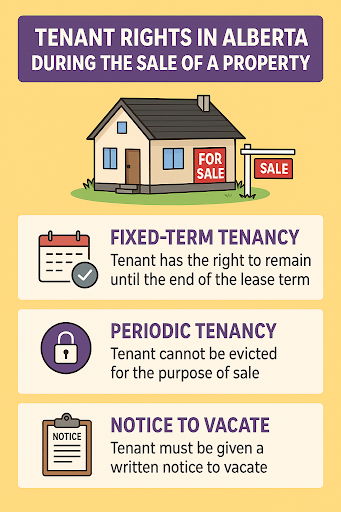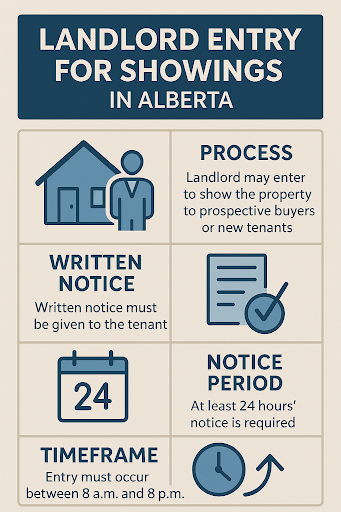
Selling a Tenanted Property in Alberta: A Landlord’s Guide to Rights, Rules & Strategies
Thinking of selling your tenanted investment property in Alberta? Whether you’re a landlord in St. Paul, Bonnyville, or managing rentals in a larger city like Edmonton or Calgary, the process isn’t as simple as just listing it. When tenants are involved, you step into a world guided by Alberta’s Residential Tenancies Act (RTA) – a framework designed to protect both your rights as a property owner and your tenants’ rights to secure housing.
Many landlords feel a knot of uncertainty: How do I show the property without violating tenant rights? What happens to the existing lease? Can I even ask the tenants to leave if the buyer wants vacant possession? Getting this wrong can lead to delays, disputes, and even legal headaches.
This guide cuts through the confusion. We’ll lay out your rights, responsibilities, and proven strategies for successfully selling your tenanted property in Alberta, all while staying compliant with the RTA.
Heads Up: Not Legal Advice!
It’s crucial to understand that while this guide provides practical information from a real estate perspective based on Alberta’s RTA (as of 2024-2025), it is not legal advice. Every situation is unique. We strongly recommend consulting with a qualified Alberta lawyer specializing in residential tenancy or real estate law for advice tailored to your specific circumstances. Century 21 Poirier is here to guide you through the real estate process, but legal counsel should be sought for definitive interpretations of the law.
Now, let’s get into what you need to know.
The Foundation: Understanding Alberta’s Residential Tenancies Act (RTA)

The cornerstone of landlord and tenant relationships in Alberta is the Residential Tenancies Act (RTA). This provincial law applies to most residential rental situations, from houses to apartments, and outlines the minimum rights and responsibilities for both landlords and tenants. You can’t contract out of these minimum standards.
The RTA aims to balance the landlord’s property rights with the tenant’s right to security and peaceful enjoyment of their home. When selling, understanding this balance – and specifically how the RTA treats different lease types – is your first critical step. The biggest distinction? Whether your tenant is on a fixed-term lease or a periodic tenancy.
Selling with a Fixed-Term Lease: The Lease Survives the Sale

If your tenant signed a lease agreement with a specific end date, that’s a fixed-term lease. Selling the property doesn’t automatically end this agreement.
The “Lease Follows the Property” Rule Explained
This is a fundamental principle in Alberta: the fixed-term lease is tied to the property, not the owner. When you sell, the new owner steps into your shoes as the landlord and is legally obligated to honour all terms of that existing lease until the specified expiry date. This includes the rent amount, included services, and any other conditions agreed upon.
Crucially, neither you (the seller) nor the new owner can force the tenant to leave or unilaterally terminate the lease early simply because the property is being sold. The tenant has the legal right to stay for the full term they signed up for. Communicating this clearly to potential buyers is essential, as it directly impacts their plans for the property.
What if the Buyer Wants Vacant Possession?

Sometimes a buyer, especially if they plan to live in the home themselves, will only make an offer conditional on getting vacant possession. With a fixed-term lease in place, there’s only one RTA-compliant way to end it early: mutual agreement between the landlord (you, or potentially the buyer after closing) and the tenant.
Both parties must willingly consent to terminate the lease before its expiry date. Because tenants have strong protection under a fixed-term lease, they often hold significant leverage in these negotiations. You might need to offer incentives to encourage them to agree to the disruption and cost of moving early. Common strategies include:
- “Cash for keys”: Offering a lump sum payment.
- Covering moving expenses: Paying for movers or a truck rental.
- Rent assistance: Offering a period of free rent at the current place or help with the first month’s rent at their new place.
Always get any mutual agreement to terminate early in writing, clearly stating the terms, the new move-out date, and any compensation agreed upon.
Selling with a Periodic Tenancy (e.g., Month-to-Month)

A periodic tenancy doesn’t have a fixed end date and continues for successive periods (like month-to-month) until properly terminated by either the landlord or tenant according to RTA rules.
Tenancy Continues Unless Specific Conditions Are Met
Just like fixed-term leases, a periodic tenancy doesn’t automatically end when the property sells. The agreement, with its existing terms, simply transfers to the new owner, who becomes the new landlord. The tenancy continues uninterrupted unless it’s terminated following very specific RTA rules related to a sale.
When Can a Periodic Tenancy Be Terminated for Sale?
The RTA allows a periodic tenancy to be ended in connection with a sale only if all of the following conditions are met:
- Firm Sale: The property has been sold (i.e., a purchase agreement is in place), AND all conditions in that agreement (like financing or inspection) have been satisfied or waived.
- Purchaser Occupancy: The purchaser (the buyer) intends in good faith to move into the residential premises OR has a qualifying relative who intends to move in.
- A “qualifying relative” typically includes a spouse, adult interdependent partner, child, parent, or sibling of the purchaser.
- Written Request: The purchaser must request in writing that the landlord (either you, the seller, before the possession date, or the new owner after possession) give the tenant a notice to end the tenancy.
If any of these elements are missing, the tenancy continues under the new owner.
The Crucial 3-Month Notice Period (for Month-to-Month)
If all the above conditions are met for a month-to-month tenancy, the landlord must provide the tenant with written notice of termination giving them at least three full tenancy months to move out.
- “Full tenancy month” means the notice must cover three complete calendar months based on the rent cycle. For example, if rent is due on the 1st and proper notice is given on January 25th (AFTER conditions are removed), the three full months are February, March, and April. The termination date would be April 30th.
- Timing is Critical: This notice can only be served after all conditions in the purchase agreement have been satisfied or waived. Serving it before the sale is unconditional makes the notice invalid. This protects tenants from moving unnecessarily if a sale falls through.
- Other Periodic Tenancies: For a week-to-week tenancy, the notice period is one full tenancy week. For other less common periodic types, it’s 90 days.
What if the Buyer is an Investor (Not Moving In)?
If the buyer is an investor who intends to keep renting out the property and doesn’t plan to live there themselves (or have a qualifying relative move in), then this specific reason for terminating a periodic tenancy cannot be used. The periodic tenancy simply continues with the new owner as the landlord under the existing terms until it’s ended for other valid RTA reasons (unrelated to the sale).
Also, note that you (the current landlord) cannot use the “purchaser occupancy” reason to end a tenancy if your actual intent is different (e.g., you want the unit for your own use). Claiming landlord’s own use is a separate process under the RTA with different rules and notice periods.
Table Comparison: Fixed-Term vs. Periodic Tenancy During a Sale
Here’s a quick summary of the key differences:
| Feature | Fixed-Term Tenancy | Periodic Tenancy (e.g., Month-to-Month) |
| Continuation upon Sale? | Yes, new owner is bound by the existing lease terms until expiry. | Yes, new owner is bound by existing lease terms unless properly terminated for specific RTA-prescribed reasons related to the sale. |
| Can Landlord/New Owner Terminate for Sale? | No, not before the lease expiry date, unless there is mutual agreement. | Yes, if the purchaser (or their qualifying relative) intends to occupy the premises, and specific conditions are met. |
| Notice Period (If Sale Termination Applies) | Not applicable for early termination by landlord/new owner. | For month-to-month: At least 3 full tenancy months’ written notice, given after all sale conditions removed. |
| Tenant Security Level (Re: Sale) | High. Tenancy is secure for the agreed term. | Moderate. Tenancy can be ended if purchaser intends to occupy, subject to strict notice rules. |
Accessing the Property for Showings: Rules & Respect

When your property is listed, potential buyers need to see it. The RTA balances your need to show the property with the tenant’s right to privacy and quiet enjoyment.
The Mandatory 24-Hour Written Notice Rule
Section 23 of the RTA is clear: you must give your tenant at least 24 hours’ written notice before entering their home to show it to prospective purchasers or mortgagees. This isn’t optional.
A valid written notice must:
- Be in writing (verbal notice isn’t enough unless the tenant consents at the time of entry).
- Be signed by you (the landlord) or your authorized agent (e.g., your Realtor).
- State the reason for entry (e.g., “to show the premises to prospective purchasers”).
- State the date and specific time (or timeframe) of the proposed entry.
If any part is missing, the notice might be invalid, and the tenant could refuse entry.
Entry with proper notice is generally permitted between 8:00 a.m. and 8:00 p.m. You cannot enter on a Sunday or any other day that is a holiday or the tenant’s regular day of religious worship, unless the tenant agrees or specific exceptions apply (like the tenant giving notice for a specific religious day, potentially allowing Sunday entry instead).
Managing Multiple Showings & Reasonableness
You need to provide a separate written notice for each planned entry. A blanket notice like “showings every weekend 1-4 pm until sold” is not compliant.
While the RTA gives you the right to enter with proper notice, it must be exercised reasonably. The entry time should be for a “reasonable duration,” and convenience doesn’t automatically equal reasonableness. Scheduling multiple long showings every single day could be seen as substantially interfering with the tenant’s quiet enjoyment, even if each notice technically meets the 24-hour rule. Communication and attempting to coordinate with the tenant can help avoid disputes here.
Tenant’s Rights and Obligations During Showings

Tenants have rights during the showing process:
- Right to Be Present: Tenants do not have to leave their home during showings, even if you or your agent prefer they do. They can stay if they choose.
- Property Condition: The RTA requires tenants to keep the premises “reasonably clean”. This applies during the sale period, but it doesn’t mean “show home perfect.” Expect normal, lived-in conditions.
- Refusing Entry: If you fail to provide proper notice (less than 24 hours, not written, missing info, wrong time/day), the tenant has the legal right to refuse entry. This underscores why following the notice rules precisely is vital.
- Accommodation: While tenants can’t unreasonably refuse entry with proper notice, landlords are encouraged to accommodate reasonable requests if possible (e.g., avoiding nap times for children) to foster cooperation.
Remember, the RTA sets minimum standards. Building rapport through respectful communication often leads to a smoother process than strictly relying on the letter of the law.
Table Summary: Key Notice Requirements (Entry & Termination)
Here’s a quick reference for the main notice types discussed:
| Action | Notice Period | Who Gives Notice | Key Conditions/Notes |
| Entry for Showings | At least 24 hours’ written notice | Landlord to Tenant | Must be written, signed, state reason (showings), date, specific time (8 am-8 pm, restrictions apply). Separate notice per entry required. |
| Termination of Month-to-Month (Purchaser/Relative Occupancy) | At least 3 full tenancy months’ written notice | Landlord to Tenant (at purchaser’s request) | Notice only valid after all sale conditions removed. Purchaser or qualifying relative must intend to occupy. |
| Termination of Week-to-Week (Purchaser/Relative Occupancy) | At least 1 full tenancy week’s written notice | Landlord to Tenant (at purchaser’s request) | Same conditions as above apply (sale finality, purchaser occupancy). |
| Termination of Fixed-Term for Sale | Not Applicable | N/A | Cannot be terminated by landlord/new owner solely for sale before expiry. Requires mutual agreement with tenant to end early. |
Disclosure Obligations: Transparency is Non-Negotiable

Being upfront is crucial when selling a tenanted property in Alberta. You have disclosure duties to both your tenant and potential buyers.
To Your Tenant
- Intent to Sell: While the RTA doesn’t explicitly require you to tell your tenant you plan to sell before listing, it’s highly recommended as a best practice. Early, clear communication about the process (especially showings) can reduce anxiety and foster cooperation.
- Post-Sale Notification: Once the sale closes, the new owner must inform the tenant. This notice should include the new landlord’s name and address for service in Canada. Critically, the new owner must also provide a written statement confirming the amount of the security deposit (plus any interest) transferred from you.
To Potential Buyers
You have a fundamental legal and ethical duty to tell any potential buyer that the property is tenanted. You must also disclose the material terms of the lease:
- Is it fixed-term or periodic?
- If fixed-term, what’s the expiry date?
- What is the current rent amount?
- What services are included?
- How much is the security deposit being held?
This information is vital for a buyer’s decision and their understanding of the legal obligations they’ll inherit. Failure to disclose accurately can lead to serious disputes later.
Protecting Tenant Privacy (PIPA Compliance)
Remember that tenant leases and related documents contain personal information protected under Alberta’s Personal Information Protection Act (PIPA). You need to handle this information carefully when sharing details with potential buyers, agents, or appraisers.
Generally, you should:
- Inform tenants that necessary information (like lease terms) might be shared with serious prospective buyers during due diligence.
- Only disclose the information reasonably required for the sale purpose. Avoid sharing full documents indiscriminately.
- Consider obtaining specific tenant consent for disclosure to qualified buyers.
- Ensure buyers understand their obligation to protect the tenant’s information too.
Adhering to PIPA helps avoid privacy complaints and potential penalties.
Strategies for a Smoother Sale in Alberta

Knowing the rules is one thing; navigating the process smoothly requires strategy and good communication, wherever you are in Alberta.
- Communicate Early & Often: Be open, honest, and respectful with your tenants from the start. Explain the process, listen to their concerns, and answer questions promptly. Informed tenants are usually more cooperative.
- Consider Incentives: Acknowledge the disruption selling causes. Small gestures can go a long way towards encouraging cooperation with showings (e.g., keeping the place extra tidy, being flexible with timing). Consider offering gift cards for showings, a temporary rent reduction, or covering a cleaning service.
- Document Everything: Keep copies of all written notices (with proof of service if possible), emails, letters, and any agreements made (especially mutual agreements to end a lease). This protects you if disputes arise.
- Know Your Market: Not all buyers want vacant possession. Investors often prefer properties with reliable tenants already in place. If your property has a long fixed-term lease or the 3-month notice period for periodic tenants doesn’t fit a quick sale timeline, marketing specifically to investors (whether in St. Paul, Bonnyville, or elsewhere) could be advantageous.
- Know the RTDRS: If disputes arise that can’t be resolved through communication, either party can apply to Alberta’s Residential Tenancy Dispute Resolution Service (RTDRS) for mediation or adjudication. It’s often faster and less formal than court.
How Working With a Knowledgeable Alberta Realtor Helps

Navigating the RTA rules, managing tenant communication, handling showings, negotiating offers involving tenancies, and ensuring all paperwork is compliant adds complexity to selling an investment property anywhere in Alberta. This is where an experienced local Realtor becomes invaluable.
A Realtor who understands the specific requirements of Alberta’s RTA and the dynamics of your local market (like the team at Century 21 Poirier does for the St. Paul and Bonnyville areas) can help you:
- Develop a realistic selling strategy considering the tenancy.
- Manage communications and showing schedules professionally.
- Ensure proper notices are used and procedures followed.
- Market your property effectively, potentially targeting investors if appropriate.
- Advise you during offer negotiations, especially regarding conditions related to the tenancy.
- Coordinate with lawyers and other professionals to ensure a smooth closing.
Ready to sell with confidence?
Connect with a Realtor who understands Alberta’s RTA rules and your investment goals. Reach out to Century 21 Poirier today!
Conclusion: Selling Smart and Legally in Alberta

Selling a tenanted property in Alberta successfully hinges on understanding and respecting the legal framework set out by the RTA. Key takeaways include honouring fixed-term leases, strictly following notice requirements for entry and termination (when applicable), and maintaining clear, respectful communication with your tenants. Planning ahead and knowing your obligations before you list is crucial.
Final Reminder: Seek Professional Advice
This guide provides a comprehensive overview, but it isn’t a substitute for professional advice tailored to your unique situation. For legal interpretations and guidance on specific RTA matters, always consult a qualified Alberta lawyer experienced in residential tenancy law. The best way to find a lawyer is by using the Law Society of Alberta’s Lawyer Directory, which allows you to search by location (like St. Paul or Bonnyville) and relevant practice areas (such as Real Estate Law or Landlord & Tenant Law). While Century 21 Poirier works frequently with various professionals, finding the right legal fit is a personal choice, and the Directory is the most comprehensive resource.
Selling an investment property is a major step. If you’re considering selling your tenanted property in St. Paul or Bonnyville, the team at Century 21 Poirier is ready to provide expert real estate guidance. Contact us today to discuss your situation.
Frequently Asked Questions (FAQ)
Q: Can I evict my tenant in Alberta just because I want to sell my house?
A: No. You cannot end a fixed-term lease early solely because you want to sell. For a periodic tenancy (like month-to-month), you can only terminate it due to a sale if the buyer (or their qualifying relative) intends to move in, and you provide the proper written notice (3 full tenancy months for month-to-month) after the sale conditions are removed. Selling, by itself, is not grounds for eviction outside these specific rules.
Q: How much notice do I have to give my tenant for property showings in Alberta?
A: You must provide at least 24 hours’ written notice before each entry for showing the property to potential buyers or mortgagees. The notice must be signed and state the reason, date, and specific time of entry (between 8 am and 8 pm, with day restrictions).
Q: Does the tenant have to let me and potential buyers in if I give proper notice?
A: Generally, yes. If you have provided valid 24-hour written notice according to RTA rules, the tenant cannot unreasonably refuse entry. However, if the notice is improper (e.g., verbal, less than 24 hours, missing information), the tenant has the right to refuse entry.
Q4: Do my tenants have to leave the house during showings in Alberta?
A: No. Tenants have the legal right to be present in their home during showings, even if you or buyers might prefer they weren’t there. They are not obligated to vacate the premises.
Q5: What happens to my tenant’s security deposit when I sell the property in Alberta?
A: The security deposit (including any accrued interest) must be transferred from you (the seller) to the new owner (the buyer) as part of the closing process. The new owner must then provide the tenant with a written statement confirming the amount transferred.
Q6: My tenant is on a fixed-term lease for another 8 months, but my buyer wants the house empty upon closing. What are my options?
A: Since you cannot unilaterally break the fixed-term lease for the sale, your only option is to negotiate a mutual agreement with your tenant to end the lease early. This usually involves offering some form of compensation or incentive (like covering moving costs or paying a lump sum) in exchange for their agreement to vacate before the lease expiry date. Get any agreement in writing.
Q: Can I give my month-to-month tenant the 3-month termination notice as soon as I accept an offer?
A: No. The 3-month notice (required when the buyer or their relative intends to occupy) can only be served after all conditions in the Agreement of Purchase and Sale have been satisfied or waived (i.e., the sale is firm). Serving notice based on a conditional offer is invalid.
Q8: Does email or text message count as “written notice” for entry or termination in Alberta?
A: The RTA generally requires notices to be properly served (e.g., handed directly to the tenant, sent by registered mail, posted on the door). While electronic communication is common, whether email/text constitutes valid legal notice under the RTA can be contentious and depends on prior agreements or circumstances. It’s safest practice to use official RTA forms and methods of service outlined by Service Alberta or seek legal advice to ensure compliance, especially for critical notices like termination.

categories
Archive
- October 2025
- September 2025
- June 2025
- March 2025
- January 2025
- October 2024
- July 2024
- May 2024
- November 2023
- June 2023
- March 2023
- November 2022
- October 2022
- July 2022
- May 2022
- March 2022
- January 2022
- December 2021
- October 2021
- August 2021
- July 2021
- April 2021
- March 2021
- February 2021
- January 2021
- December 2020
- November 2020
- October 2020
- September 2020
- August 2020
- July 2020
- June 2020
- May 2020
- April 2020
- March 2020
- February 2020
- January 2020
- December 2019
- November 2019
- October 2019
- September 2019
- August 2019
- July 2019
- June 2019
- May 2019
- April 2019
- March 2019
- January 2019
- December 2018
- November 2018
- October 2018
- September 2018


